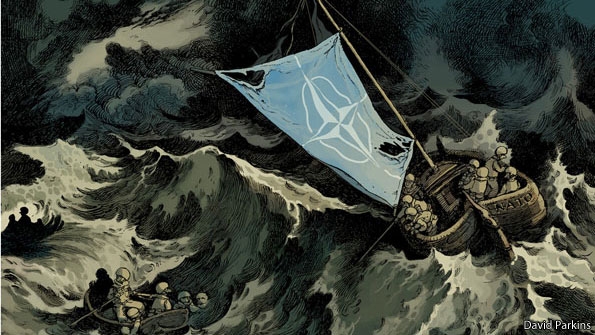
From the Economist: As preparations begin for NATO’s Chicago summit in May, the 63-year-old alliance is facing a perfect storm of problems. Even if it can overcome them, the organisation that has formed the bedrock of European security since the ending of the second world war, and which only a few years ago aspired to become “global NATO”, faces a future of reduced means and more modest ambitions. . . .
Europe’s economic crisis has put further pressure on already shrunken national-defence budgets. In its annual report “The Military Balance”, the London-based International Institute of Strategic Studies (IISS) noted that for the first time in modern history, Asian defence spending is about to overtake that of Europe.
Compounding that problem is America’s strategic pivot towards the Western Pacific, in response to China’s rapid military expansion. Published in January, the new “strategic guidance” only confirmed trends that have been gathering pace for many years. America’s statement that Europe should now be a producer of security, rather than a consumer, combined with an announcement that a quarter of the remaining American forces stationed in Germany would soon be coming home, carried an implicit warning to the European members of NATO. . . .
[Then-Secretary of Defense Robert] Gates lambasted his European allies for the slow progress against a puny opponent and for failing to invest in the capabilities that America was forced to provide, such as air-defence suppression, ISTAR (Intelligence, Surveillance, Target Acquisition and Reconnaissance) and aerial refuelling. Unless the Europeans plugged those gaps, he questioned, how much longer would America see NATO as a militarily useful partner? . . .
In response NATO’s energetic secretary-general, Anders Fogh Rasmussen, is touting something he calls “smart defence”—a new label for the 20-year-old idea of pooling and sharing resources, setting better priorities and encouraging countries to specialise in the things they are best at. Mr Rasmussen hopes members will agree to more than 20 projects before the Chicago summit, each led by one member country. These include the pooling of maritime patrol aircraft; the acquisition of five Global Hawk long-range reconnaissance drones; and a support package for deployed helicopters. Other schemes covering logistics, training and force protection are expected to follow.
Despite universal lip service to smart defence, scepticism abounds. François Heisbourg, chairman of the IISS and of the Geneva Centre for Security Policy, says that governments all too often choose jobs in defence companies at home over military logic. . . .
The summit will reaffirm the strength of the transatlantic partnership and Mr Rasmussen will insist that smart defence can confound the cynics and pave the way for “doing more with less”. But what the future is more likely to hold is benign neglect by America and declining military ambition in Europe. In other words, unless something changes, NATO will end up just doing less with less. (graphic: David Parkins/Economist)
Image: economist%203%203012%20David%20Parkins.jpg
